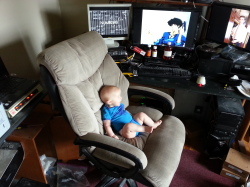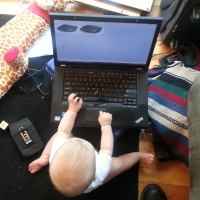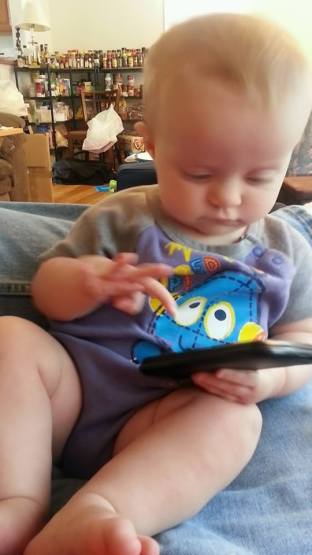Category Archives: Server Room
By way of his selection of a Featured Image on this otherwise worthy post, Tod has more or less assured that I will not be going to the Front Page of Ordinary Times today until five more featured posts are put up.
I am about to do an update of my feeds on the RSS app on my phone. The RSS app* makes updating the feeds a hassle, so it’s worthwhile to add a lot of sites at once rather than adding them as I find them. So before I go into it… are there any sites you recommend? I’m looking for anything from personal to cultural to political blogs.
* – Also, if you do Android, I’m up for hearing about good RSS apps, too. Bonus points if they can use the word “color.”
 Hit Coffee is expanding
Hit Coffee is expanding to new locations with some new writers, in case you haven’t noticed.
Malcolm Blue (aka Mr. Blue) joined some time ago, though has only periodically contributed.
This week, James Hanley (formerly of Ordinary Times and presently of Bawdy House Provisions) has joined. Professor Hanley actually used the Trumanverse map in one of his classes.
And hopefully soon, Gabriel Conroy (of Ye Olde Republicke) will also be joining us.
I don’t intend to retreat in my own output, which I will grant has not been as robust as I would like. Life intervenes. So this will be “in addition to” rather than “instead of.”
The Thinkpad T60-series is among the best series of computers ever produced. I have purchased several, and some of them still work despite being released in 2006.
The only big problem with them is that they overheat. Badly. And it gets worse as they age, even if you replace the fan, clean it out, etc.
It can be enough to make them borderline unusable, because once they reach 90-degrees, they start rebooting or going into sleep mode, and you have to wait for them to cool down before you use them again.
Since the weather has gotten colder, though, they’re much less inclined to overheat. Which sort of makes them default winter laptops, because right now they are extremely usable.
Until we start trying for Kid #2. Then I’ll have to get the still-warm laptop off my lap.
There is a monthly service that I use that I wish to upgrade from the $7/mo plan to the $10/mo plan.
They won’t let me give them more money in exchange for a higher tier of service.
To repeat, I want to give them more money than I currently do, for a service they provide, and they won’t let me.
When I emailed them to ask how to upgrade, they said “Just stop the monthly payments.”
So I did. The deadline has expired, but they haven’t cut off my old services, and won’t let me upgrade as long as I am on the old plan. I try and it tells me that there is already an active service on the account. I try to set up a new account, and it automatically links the new account to the old account, complete with a “Good news! We found your existing account!”
Dammit.
I am about to create an account under my wife’s name.
All so that I can start giving them more money.
A friend of mine made the decision to block me from his feed on Facebook, due (I mostly assume) to political differences and the conflicts that have arisen because of them. Honestly, I am not bothered by this. Historically, he has been well to my right, though that changed around 2010 when he darted left. For some reason, even though I have plenty of lefty friends, it has made relations considerably more difficult.
Anyway, because I was not unfriended, he still shows up in the feed to the right when he leaves comments on other people’s feeds. You’d think that since he doesn’t want me reading what he has to say on his feed, Facebook, that they’d get a clue that it’s probably best that he doesn’t show up there either and that we should remain Friends In Name Only or somesuch.
It’s part-and-parcel to Facebook’s weird inability to determine what should be on my feed. You’d think that the algorithm would say “Hey, he’s commented on this guys’ statuses repeatedly, so this is probably someone whose feed he’s interested in.” But not really. It thinks I really need to know what’s going on with a high school acquaintance who now lives in Connecticut, but not the person who has tagged me in posts twice in the last month.
This is one of the reasons I get less paranoid about their collecting information on me. They seem to be utterly incompetent on what to do with even the obvious parts.
(That said, I started to get ads for state government political races ragging on the DMV. That’s kind of… suspicious.)
James Joyner and Allison Slater Tate write about parenting as a Generation X’er, mostly in the context of being the last generation raised in the pre-Internet era:
It struck me recently, after one of my quiet carpool rides, that my generation of parents – we of the soon-to-be or recently 40 year old Gen X variety, the former latchkey children of the Cold War and an MTV that actually played videos, former Atari-owners who were raised by the the Cosby Show and John Hughes, graduated high school with the kids from 90210, then lumbered through our 20s with Rachel, Ross, Chandler, Monica, Phoebe, and Joey and flip phones – is perhaps the last to straddle a life experience both with and without the Internet and all its social media marvels. After all, I didn’t even learn to use e-mail until I was 19 and a sophomore in college in 1993, and only for a slightly cringe-worthy reason: a cute boy at another college asked me to e-mail him.
My generation, it seems, had the last of the truly low-tech childhoods, and now we are among the first of the truly high-tech parents.
 My formative years were truly right on the cusp of the Internet age, falling just before it. I didn’t have reliable, worthwhile Internet access until I got to Southern Tech. I did have BBSes, of course, which mattered a great deal at the time as I got to experience some of the social aspect of the Internet.
My formative years were truly right on the cusp of the Internet age, falling just before it. I didn’t have reliable, worthwhile Internet access until I got to Southern Tech. I did have BBSes, of course, which mattered a great deal at the time as I got to experience some of the social aspect of the Internet.
What I didn’t get to experience, though, was everything else. Some of which will actually be kind of hard to convey to Lain and future siblings. Much of the awesomeness of the Internet involves relatively small shifts between things that were already occurring. Before there was online shopping, there was mail order.  And Lain will shop.
And Lain will shop.
The truly big thing that the Internet brought is having a world of fact at our fingertips. It’s possible, and true, to talk about how the Internet has allowed us to live in fact-starved cocoons where the reality of politics, science, and religion is more or less choose-your-own-adventure, but scratch just below that surface and ponder how amazing it is to want to know something and be able to pretty immediately look it up the vast majority of the time. Remember what life was like before that? It was like this:
Argument About Capital Of Australia Occurs 10 Feet From Encyclopedia
ORD, NE— Brothers Jeff and Adam Clink spent 20 minutes fiercely debating the capital of Australia while standing 10 feet from the family’s World Book encyclopedia Monday. “You’re high,” Jeff, 18, told Adam. “It’s Sydney.” Adam, who said he is “99.99 percent sure” that Melbourne is the capital, conceded that one city might be the capital of the Australian continent and the other the capital of the nation.
 It’s not that you couldn’t get the answers to such things. It’s that you rarely did, if it wasn’t particularly important. One of my favorite phrases is “There’s no reason not to know when you’re holding a smartphone” and I will frequently look up points of uncertainty in the middle of group conversations. Or if someone says something that sounds not quite right, I can look it up and correct later.
It’s not that you couldn’t get the answers to such things. It’s that you rarely did, if it wasn’t particularly important. One of my favorite phrases is “There’s no reason not to know when you’re holding a smartphone” and I will frequently look up points of uncertainty in the middle of group conversations. Or if someone says something that sounds not quite right, I can look it up and correct later.
And Lain will, of course, take that almost entirely for granted. And it’ll be hard to explain how it used to be that if someone was bullspitting around, you more or less had to either shrug it off or debate it to a lack of conclusion. Like the capital of Australia was a choose-your-own-adventure political disagreement.
Of course, some of the changes are a bit disconcerting. I’d more or less figured out how we were going to handle kids and TV time. I figured this out before it became apparent that ultimately they’d be watching TV on their phones. Now I’m back to square one, without a clue as to what to do. It used to be a simple matter of not allowing them to have a TV in their bedroom, or a video game console in their bedroom or in the house. Now? Well, it’s hard to make it so that they have a world of information at their fingertips and not the ability to watch their favorite TV show.
And at some point, they won’t even need a device because it’ll be in their contact lens. But that’s a problem Lain will have to deal with if she has children.
The Ninth Circuit has ruled that Fourth Amendment protections don’t apply when it comes to sharing child porn. Dr Phi notes:
I will note in passing that, while the decision of the 9th Circuit appears to be sound as a matter of law, the opinions seem to misstate the technical facts of the case. All the judges write several times that the NCIS conducted “surveillance of all computers in the entire state of Washington.” If this were true, it would raise obvious 4th Amendment problems, but in actuality Agent Logan searched only those files being shared by a peer-to-peer file sharing program, by which its users presumably forfeit any “reasonable expectation of privacy”. But that should cause its users enough worry, seeing as how most of those files are likely in technical violation of copyright laws, which the government has prosecuted before.
As a legal matter, I’m pretty sure this is right. as a political and business matter, though, going after file sharers has proven to be something of a dead end. Lately, the content-owners have been more interested in teaming up with the ISP’s in order to kick sharers off their accounts. Which is pretty brilliant, because it’s minor enough to not create the sorts of sob stories we’ve seen with people going to prison over this. But it’s severe enough to the culpable parties that it does provide some disincentive.
Not much, though, which is the bind that the content-producers are in. And why they are most likely going to break if they do not bend. (To their credit, they have been bending.)
I recently complained about Google crippling their devices in the name of security. Lenovo, the maker of the ThinkPads I have been reliably buying for over a decade now, has decided to do the same in the name of… I don’t know. Aesthetics, I guess.
I got my hands on a Thinkpad T540p, which is their newest 15″ laptop. I got my hands off of it and I am at a loss. It is terrible. It is atrocious. It takes one of the big reasons that I (and many others) are loyal Thinkpad user and makes it decidedly inferior. Harder to use. And not in a way that I will get used to over time, most likely. Mostly, in a way that makes me question whether I will ever buy a Thinkpad again. I haven’t purchased a laptop that wasn’t a Thinkpad since 1998.
If there is a method to their madness, I don’t know what it is. it does look nicer, I guess. Buttons and their inherent functionality and ease of use have become passe, I guess. Out with the function, in with the form I suppose.
This leaves me in a lurch because, like I said, I don’t buy anything but Thinkpads. For a while I can basically continue to buy the previous models. Until it becomes outdated. If I do that, though, I will run into the same situation I am in now where every laptop in the house is becoming outdated all at once. This is because at some point I determined that the T60/T61 was the perfect model and made sure that just about all of my laptop purchases were that model. But computers become outdated over time, and start falling apart. It says a lot that I am dealing with this for a model made in 2006, but it’s inconvenient when I have spent the last two weeks trying to find use for an army of computers that can’t make the transition to Windows 7. Presumably, sticking with T520’s will be great until they all hit some other roadblock.
Then, I guess, either Lenovo will have its act together, or *gulp* I may be looking at Dells.
Incidentally, Microsoft is pretty evil. They’ve shoved down something called Secure Boot. The result of which is that it took me a half hour just to figure out how to boot a Linux LiveCD. It can be done, but man they make it difficult.
I come up with projects at the worst times, sometimes.
When we were preparing for our move from Cascadia to Arapaho, I got the silly notion that I really needed to update my college football database (which included incorporating all of the scores in c college football history).
Now we’re buying a house, and I’m working diligently on getting all of my old computers back up and running in the post-XP world. This means Linux, which means learning a whole lot about Linux. It wasn’t something I set out to do. Rather, I was working on setting up a backup MediaPC and it became apparent that Windows 7 simply wasn’t going to run on it adequately (for reasons unknown, the specs are almost the same as the primary Media PC, which runs it fine). So I installed Linux and got this whole ball rolling.
Right now I am stuck on a Thinkpad T42p. One that has some hardware flaw, to boot. It’s not easy to figure out what I would do with it if I got it working, but I can’t stop trying to get it to work. My preferred Linux distro (brand) won’t install. I can get SUSE and Fedora to install but I can’t get the video files working on it. I can install from a LiveCD where I will have video but not full network capability. It’s really driving me crazy.
And I sort of suspect that it will end up like those desktops I meticulously worked on for weeks. I got them working, finally, then realized what pieces of crap they were and dismantled them and threw them out the next week. This computer is technically weaker than those, though it’s a laptop and my standards aren’t very good. Theoretically, either a video-less networked machine or a networkless video machine could be useful somewhere. But I am hard-minded about getting both of them working. So I’m scanning distro-watch for anything that’s not Ubuntu-based* (which won’t load), polished enough to have networking capability, but not so polished and professional that they leave the video decoders off.
* – Ubuntu is the #1 Linux distro out there, and is really quite good. So good, in fact, that dozens of other distros use the exact same underlying code. That way, you can use their wonderful software bank and have access to a lot more software and its ease-of-use. My favorite distro is Mint, which is Ubuntu-based but better for this reason and that. But all of the Ubuntu-based ones use that Ubuntu installer that won’t work in this particular machine.
